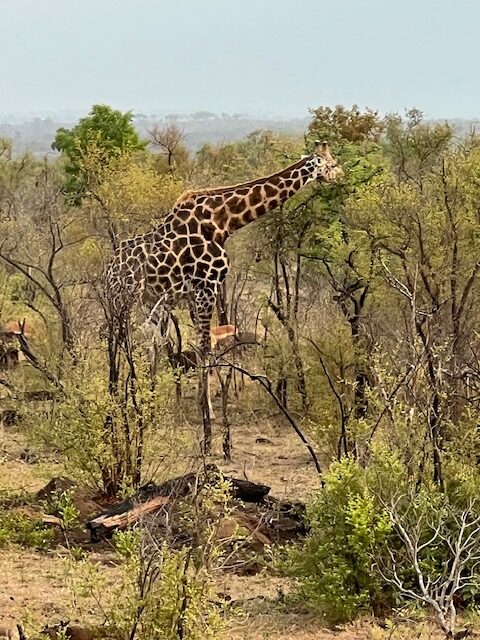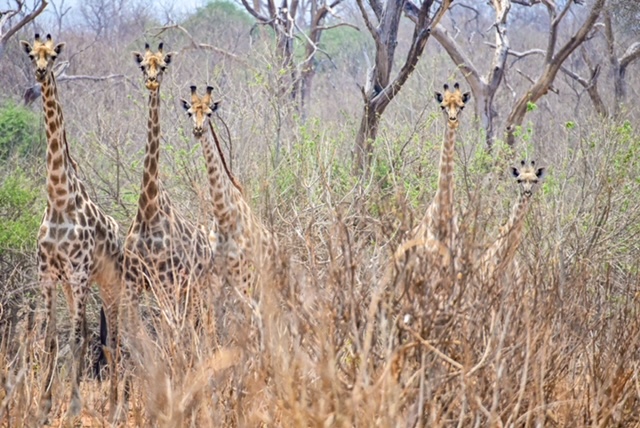Sabbatical Notes from Pastor Stephen: Adaptation
October 17, 2022

I am in awe at the beauty, resilience, and adaptability of God’s creation. This trip has wowed me with rocky coasts and cliffs, towering mountains, unique plants, colorful birds, and a myriad of fascinating creatures. Trips like this remind me of how much there is still to see, experience, and learn about creation. We can never exhaust the subject of God’s world because there’s always something new to see.
One of the interesting things I learned, while on a bush walk through the lowveld with a guide, is a unique back and forth struggle between an animal and its favorite food.
The sight of a giraffe browsing on the leaves of a majestic acacia tree is synonymous with Africa. It’s one of those things that was always in my mind when I imagined traveling to Africa. Giraffes love that tree more than any other and this fondness results in a fascinating ‘to and fro’ relationship between fauna and flora.
Giraffes can eat as much as 29 kilograms of acacia leaves and twigs daily. Herds of three or more giraffes spend hours browsing in acacia thickets, eating as much of the delicious leaves as they can. They don’t have it all their own way, however, because the acacia was not content to just be eaten!
Over time, the acacia tree has developed several clever defence mechanisms to prevent giraffes from munching on them unabated. As I’m sure most travelers to Africa can attest to (after painfully having it brush up against your arm on narrow roads when riding in open top vehicles), the acacia does not mess about when it comes to thorns. Taking their name from the Greek word for thorns – akis – some species grow thorns that are as long as 8-10 cm, and sharp as a knife. This make the tree much less enticing for animals to try and get to its leaves.
The wily giraffes have developed a counter to this though, by way of their incredible tongues. The giraffe’s tongue is about 45cm in length and highly prehensile. This allows the animal to successfully negotiate the bigger thorns and pull the leaves from the branch. Coupled with tough lips and palate that are basically numb to pain, the giraffe has seemingly overcome this particular hurdle set by the trees. But the acacia trees continued to adapt and change as the situation demanded.
Acacia trees have developed a further defense – the release of tannins. Tannins are water soluble, carbon based compounds found in plants that are very important to humans. Their chemical and physical properties allow the binding of alkaloids, gelatine and other proteins in the making of leather, or tanning. They are also used in food processing, fruit ripening and the making of wine and cocoa. But they’re no good to giraffes!
In the right amount, tannins can taste good — like in wine or tea — but sometimes when you drink a particularly strong red wine your mouth can feel a bit dry and bitter. That’s the tannins. When on our bush walk our guide had us chew on a particular leaf, then laughed at us because after a few munches we all had cotton-mouth. It was not a pleasant experience.
Besides tasting awful, tannins inhibit digestion by interfering with protein and digestive enzymes and binding to consumed plant proteins, making them more difficult to digest. When a tree starts feeling threatened and notices it’s getting damage from a giraffe, it releases more tannin into the leaves so the giraffes will stop eating it. What’s even more amazing is that acacia trees release a pheromone that is spread downwind to others trees, signaling them to release their tannin to protect themselves. The simultaneous tannin release by all nearby acacias essentially thwarts the greedy giraffe(s), who must now travel upwind to trees that have not yet been warned. This is why older and wiser giraffes have now learned to always eat upwind of other giraffes.
This back-and-forth battle between the giraffes and acacia trees reminds me of the need to change and adapt. The world around us is always changing. Sometimes that change can feel like a new opportunity and other times it can feel like an obstacle to overcome.
I believe a lot of the conflicts we have as a society come down to our inability or unwillingness to adapt. Sometimes we get frustrated over small things, like the need to adapt to new technologies when we finally got comfortable with the old ones. We resent when we have to adapt to new norms in culture, whether it’s the music or the fashion. I think every generation has complained about the music the next generation prefers.
In South Africa it’s been hard to adapt to the new black majority democracy. They are still trying to find their way. In the US we have to adapt to changing demographics, more diversity of religions, and new priorities. The choice is often to either adapt, fight for things to stay the same, or remain bitter, resentful, and withdraw as much as we can.
I’ve seen all three in the church. Church is not immune to change or the changes in society. The church certainly had to adapt to Covid. We have to adapt to new needs and challenges people are faced with, new constraints on time, and more. And when the church adapts and changes, people react in those same three ways. Some choose to fight the changes and try to keep the church exactly as they like it: same music, same activities, same look, same everything as if the church can be frozen in time as the world marches on. Others choose to be bitter and resentful about the changes and they withdraw more and more from the church until they are completely separated from the community. Others find a way to adapt to the changes in ways that best suit them and their needs. Everyone’s experience of church is different and that’s natural and okay. Some continue to livestream for various reasons, some attend Tuesday nights, some want to do as many things as possible while others find Sunday mornings more than enough.
Our church is as diverse as the natural world, so everyone’s experience of church is different. Just like the natural world, if we adapt, we can all inhabit this world and church together. It’s not always easy or quick, but we can find the right balance and live together in peace and harmony.